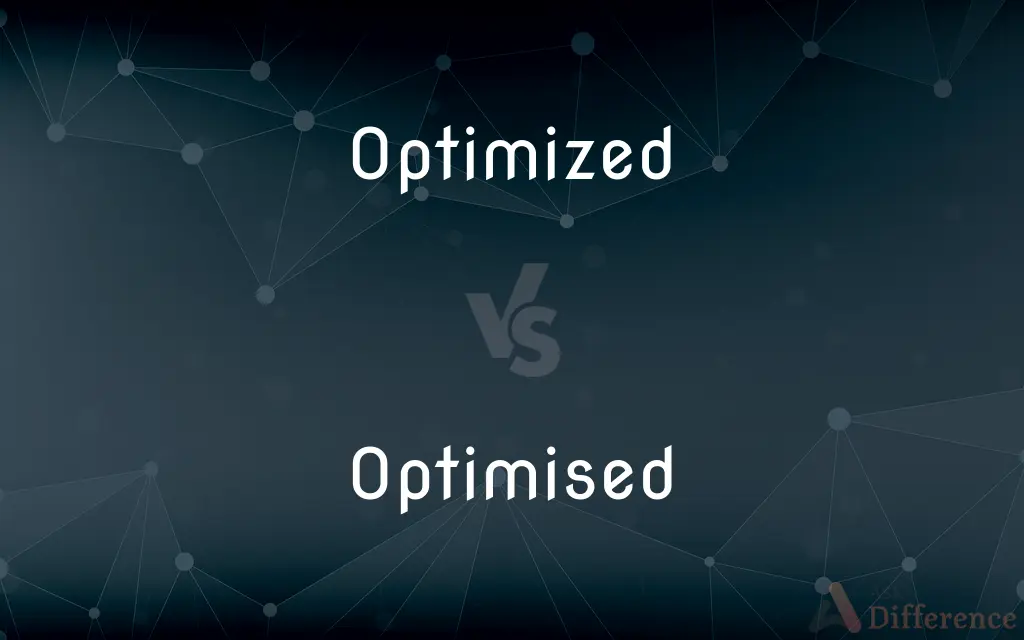Optimized vs. Optimised — What's the Difference?
By Tayyaba Rehman — Published on December 3, 2023
Optimized is American English. Optimised is British English. Both mean improved efficiency or performance.

Difference Between Optimized and Optimised
Table of Contents
ADVERTISEMENT
Key Differences
Optimized and Optimised essentially denote the same action - the act of making something as effective or functional as possible. The variance between them is geographical. Optimized is predominantly used in American English, while Optimised is its counterpart in British English.
When you encounter "Optimized" in a text, it's probable that the context and the surrounding vocabulary are tailored to the American audience. On the contrary, "Optimised" signals a British context. This divergence is akin to other differences like "color" (American) and "colour" (British).
It's crucial to be aware of these nuances, especially if you're writing for a specific audience. For an American readership, "Optimized" will seem more familiar and standard. However, if targeting the UK or other Commonwealth nations, "Optimised" will be more apt.
In the realms of technology, especially in global software products, you might encounter both. For instance, American tech companies might use "Optimized" in their interfaces, while a British firm might stick to "Optimised." Nonetheless, understanding that both words mean the same thing ensures clear communication.
Comparison Chart
Spelling
Ends with "-ized"
Ends with "-ised"
ADVERTISEMENT
Geographical Use
American English
British English
Example Sentence
"The software is optimized."
"The software is optimised."
Associated Variants
"Color", "Analyze"
"Colour", "Analyse"
Etymology
From American English conventions
From British English conventions
Compare with Definitions
Optimized
Improved for peak performance.
The engine is optimized for fuel efficiency.
Optimised
Enhanced for superior functioning.
The system is optimised for user experience.
Optimized
Refined to achieve the best outcome.
The algorithm is optimized for speed.
Optimised
Modified for the best possible result.
The recipe is optimised for taste.
Optimized
Adjusted for best results.
The ad campaign is optimized for a younger audience.
Optimised
Streamlined for utmost efficiency.
The routine is optimised to boost productivity.
Optimized
Enhanced to its utmost potential.
The website is optimized for mobile use.
Optimised
Upgraded to its highest capacity.
The tool is optimised for versatility.
Optimized
Tweaked for maximum efficiency.
The workflow is optimized to save time.
Optimised
Perfected for a specific purpose.
The strategy is optimised for market penetration.
Optimized
To make as perfect or effective as possible.
Optimised
Simple past tense and past participle of optimise
Optimized
(Computers) To increase the computing speed and efficiency of (a program), as by rewriting instructions.
Optimized
To make the most of.
Optimized
Simple past tense and past participle of optimize
Common Curiosities
Can I use "Optimized" and "Optimised" interchangeably?
While both mean the same, use "Optimized" for American audiences and "Optimised" for British ones.
How is "Optimised" different from "Optimized"?
"Optimized" is American English, while "Optimised" is British English; both have the same meaning.
Are there other words with similar differences?
Yes, like "color" (American) vs. "colour" (British).
In software, which form is more common?
It varies by the company's origin, but both forms can be found in global software.
Which form is taught in international schools?
It depends on the curriculum. British systems teach "Optimised", while American systems teach "Optimized".
What does "Optimized" mean?
"Optimized" means improved for better performance or efficiency.
Are there exceptions to using "Optimized" in the US?
While "Optimized" is standard, international publications or audiences might see "Optimised".
Should I correct someone using "Optimised" in the US?
No, it's just a regional variation. Both are correct.
If a software uses "Optimised", is it from the UK?
Not necessarily. While "Optimised" is British English, global software can use either form.
Do Canadians use "Optimized" or "Optimised"?
Canadians typically use British spellings, so "Optimised" might be more common.
Is one form older than the other?
Both forms evolved over time, but their divergence is more about regional preferences than age.
Do dictionaries list both forms?
Yes, most comprehensive dictionaries mention both spellings and their regional usage.
Why do these spelling differences exist?
Historical linguistic evolution and regional influences led to these variations.
Is understanding both forms crucial for English learners?
It's beneficial for global communication, but not mandatory. The context often clarifies meaning.
Which form is used in scientific journals?
Both can appear, but it often depends on the journal's origin or its target audience.
Share Your Discovery

Previous Comparison
Meta Tags vs. Keywords
Next Comparison
Paraben vs. ParaffinAuthor Spotlight
Written by
Tayyaba RehmanTayyaba Rehman is a distinguished writer, currently serving as a primary contributor to askdifference.com. As a researcher in semantics and etymology, Tayyaba's passion for the complexity of languages and their distinctions has found a perfect home on the platform. Tayyaba delves into the intricacies of language, distinguishing between commonly confused words and phrases, thereby providing clarity for readers worldwide.











































